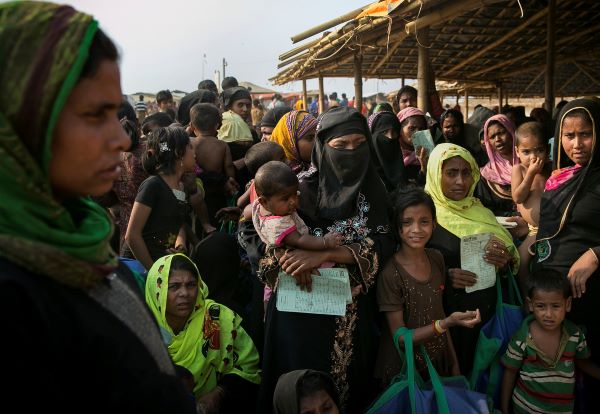2 January 2023 ~
In the past six weeks, nearly five hundred Rohingya have fled Myanmar, or another host country, and taken to the sea, searching for a place where they could have a meaningful life, without the fear of persecution.
Nearly 200 Rohingya refugees were adrift at sea for weeks in the Bay of Bengal when the boat engines stopped working. They were in search of safety, to escape persecution. They were in search of a better life, educational opportunities, resources to provide for their families, and medicines to help the family they left behind. They were sick, hungry, dehydrated, and praying for rain so they could have water to drink. Some tried to drink seawater. More than twenty people died on the boat, adrift at sea.
In the Name of Humanity
Aid agencies implored countries in the region to rescue the group but to no avail. The UN made multiple pleas for interventions, in the “name of humanity”, but those pleas went unanswered. Then on 26 December, there was a shift, and the 185 surviving Rohingya men, women, and children were rescued, and the group was received in Sumatra Indonesia.
However, tragically, another boat with 180 Rohingya refugees aboard, could not withstand the sea and it sank. As of yet, no survivors have been found. It is believed that all 180 refugees perished at sea.
In early December, a Vietnamese oil tanker rescued 154 Rohingya on its way to Myanmar. The Rohingya were handed over to Myanmar authorities, where they were put in migration detention. They now face criminal charges for trying to flee the country. A week later, the Sri Lankan Navy rescued 104 Rohingya, mostly unaccompanied children. They too have been placed in detention as a punishment for trying to escape Myanmar’s oppressive policies.
These are the latest in a series of dangerous attempts by the Rohingya to escape persecution and misery. In the nearly two years since the February 2021 coup, several thousand Rohingya have fled Myanmar. In the balance of that time, nothing has been done to change the outcome for the Rohingya. There have been no inclusive, thorough, and lasting solutions to help resolve their situation. There have been no measures agreed to that would include them in society. There have been no agreements made that would even allow them to return home and be safe. They are still being punished for being… Rohingya.
A Story Heard Too Often
It is possible that many, hearing these stories, will struggle to understand what makes people risk their lives by getting on a rubber dingy – or a barely seaworthy boat and set to sea – into uncertainty, into danger. But remember the saying, “until you walk a mile in the other person’s shoes…” The Rohingya are considered the most persecuted people in the world, and the misery they suffer is unconscionable. And although they have lived in Myanmar for many centuries, they are Stateless. What does that mean? It means that the government of Myanmar – the country they have lived in all their lives will not allow them to have citizenship – to have a national identity. The government even banned the mention of their name.
The fact is the Rohingya exist in dire conditions, and those conditions are wrapped in desperation. But in desperation is the hope that the risk of traveling will lead them to a place where they can start anew and have something better, something safer… a future without the fear of persecution.
Deteriorating Humanitarian Conditions
In Myanmar, more than 150,000 Rohingya are still confined in camps in Rakhine State. Since the coup, an increase in human rights violations that amount to crimes against humanity and war crimes, a volatile security situation, and rapidly deteriorating humanitarian conditions in Myanmar make circumstances even less favorable for refugees to return. UN Secretary-General Antonio Guterres noted that part of the Myanmar-led solution to the current crisis in the country includes the expectation of full and effective participation of the Rohingya.
Many of the Rohingya at sea fled from a camp in Bangladesh. Five years ago, more than 700,000 Rohingya fled Myanmar to escape a brutal military crackdown in 2017. It was a crackdown that was labeled as “ethnic cleansing” by the UN. Bangladesh generously agreed to host the Rohingya refugees. Today there are at least one million refugees in Cox’s Bazar camp. However, conditions in the camp are grim and there are frequent reports of sexual assault and violence against women and girls.
Global Responsibility
But one country cannot and should not alone bear the responsibility for hosting refugees. It should be a global responsibility. The hosting of refugees and displaced persons is an ongoing problem surrounding conflicts in other regions of the world, i.e., Lebanon and Turkey hosting Syrian refugees. There should be a more humane response to those fleeing conflict, violence, and persecution, including Rohingya refugees. Further, the UN Security Council and governments around the world should use their power, and every tool at their discretion, to immediately apply pressure to countries that violate the rights of its citizens and persecute minorities to the point that they flee the country in mass numbers.
In the name of humanity, for the sake of humanity – more needs to be done to ensure the protection and inclusion of the Rohingya.
With gratitude… Lara
Photo Credit: Bangladesh – Rohingya women in refugee camps share stories of loss and hopes of recovery by UN Women Gallery. Licensed under CC by NC-ND 2.0
ThinkingOutLoud #Rohingya #Bangladesh #Myanmar #myanmarjunta #responsibilitytoprotect

